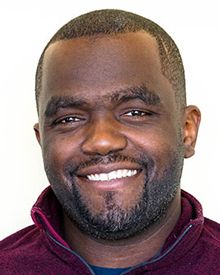 Matthew R. Kay is the founder and coordinator of the Philly Slam League, a nonprofit that hosts poetry teams from Philadelphia-area high schools in a five-month intellectual and artistic competition. A proud product of Philadelphia’s public schools, Kay is a founding teacher at Science Leadership Academy, where he teaches an innovative inquiry-driven, project-based curriculum. He recently published his first book, Not Light, But Fire: How to Lead Meaningful Conversations about Race in the Classroom (Stenhouse).
Matthew R. Kay is the founder and coordinator of the Philly Slam League, a nonprofit that hosts poetry teams from Philadelphia-area high schools in a five-month intellectual and artistic competition. A proud product of Philadelphia’s public schools, Kay is a founding teacher at Science Leadership Academy, where he teaches an innovative inquiry-driven, project-based curriculum. He recently published his first book, Not Light, But Fire: How to Lead Meaningful Conversations about Race in the Classroom (Stenhouse).
His answers were edited for clarity and length.
What inspired you to write Not Light, but Fire: How to Have Meaningful Classroom Conversations About Race?
“There’s a lot of good information about why we should be discussing race in the classroom. There are already many robust conversations about that. What we need more of is a clear how-to. I hear a lot of this from teachers: ‘I want to talk about race and I know I should, but when I do, my kids walk away feeling worse—what am I doing wrong? We’re reading the right books, were diversifying our books, were doing all the things they tell me to.’
A great deal of success comes from being mindful about how you’re developing relationships with students. Not just between you and the students, but between the students and each other. How do you train the kids to listen to each other, and to be respectful of each other’s opinions and ideas? How do you, after establishing that environment, challenge the kids. A lot of times we bore students with race issues that should not be boring, because we haven’t let race conversations be intellectually rigorous. Or unique.
In the book, I call [Black History Month] February soup—how most kids take in their black history. Everything is thrown into the same pot. They don’t know anything is different from anything else. A student, after nine years of schooling, will say that Frederick Douglass and Martin Luther King grew up in the same neighborhood, they rode a bus with Rosa Parks. It’s all a big mess and they never really plug into a specific issue because it’s all bland.
We keep having the same conversations over and over, we keep shedding light on things people already understand. How do you talk about racism in a way where students feel like they’re actually about to learn something new?”
Can you give us a glimpse into the theme of your presentation at ILA 2018? What do you want attendees to take away from your presentation?
“I want folks to reflect on how bad we are as a society about talking about race—on the left, on the right, everywhere—we’re just bad at talking about race. We’re going to reflect on what we are modeling for kids and what might be the impact of that. What are kids learning when they hear us talking about race? To the point of February soup—when we confine all of our race conversations to one month, what does that teach students about race? When we only discuss race in terms of white oppression, what does that do to people’s understanding of the depths of racial identity?
I just want to reflect upon a lot of our bad habits—hopefully things that folks have never thought about.”
You said that poetry has helped you to overcome your stutter by improving your confidence. What changes have you seen in your students?
“There are big successes. I have a lot of alumni poets that are teachers now. I take a little pride in that; some of those kids would not have been teachers if they hadn’t formed those relationships with their coaches and teams.
Most of Philly’s youth poet laureates have come through my league. There are those high-profile successes. But then there are a lot of micro successes. The league makes being a mentor cool. Before you called, I was talking to some alumni who were asking if they can come back and work with younger poets. Of all the things, I’m most proud about that. We have a lot of kids who might not ordinarily be living service lives, but now, they want to give back. And I think that’s good for the city, and it’s good for the kids.
Some kids fall in love with it and become poetry lifers, and that’s fantastic. But I also celebrate the kids who started freshman year and didn’t have confidence, and afterward, gained the confidence to do something else.”
The theme of ILA 2018 is Be a Changemaker. What is a changemaker to you?
“Are you going to be a solution-finder or someone who just talks a lot? If there’s any one unifying characteristic of our race discourse right now, it’s that everyone is wordy. Everything is a speech contest. An interrupting speech contest. You have people going back and forth and back and forth, and sometimes both sides have good will—and if they would just shut their mouths and listen, they would realize how much they agree on.
Listening is much harder. Someone who’s willing to change things is willing to sit down and listen. Then we can get to, “What are we going to do next?”
Alina O'Donnell is the communications strategist at ILA and the editor of Literacy Daily.